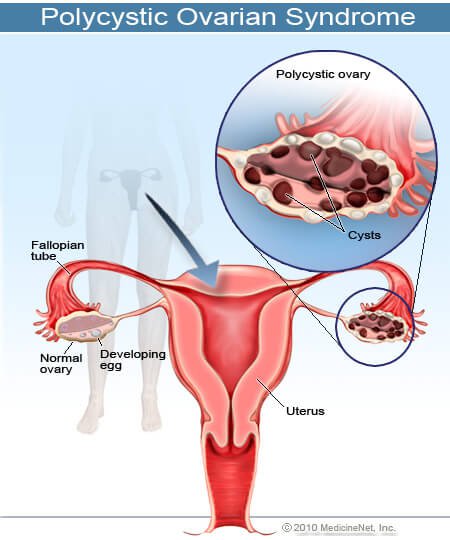Understanding Polycystic Ovary syndrome
Understanding Polycystic Ovary syndrome

WHAT IS PCOS?
Polycystic Ovarian syndrome is a hormonal disorder among women of reproductive age between the ages of 15-44years. The hormonal imbalance creates problems in the ovaries. The ovaries make the egg that is released each month as part of a healthy menstrual cycle.
With PCOS, the egg may not develop as it should or it may not be released during ovulation as it should and this can cause missed or irregular menstrual periods.
PCOS is a major cause of infertility. Most women find out they have PCOS in their 20s & 30s when they have problems getting pregnant. Women of all races and ethnicities are at risk of PCOS. Your risk may be higher if you have obesity or if you have a sister or mother or aunt with PCOS.
Understanding your menstrual cycle is the key and for you to seek help early.
COMPLICATIONS OF POLYCYSTIC OVARIAN SYNDROME
If a woman has polycystic ovarian syndrome, that means that her ovaries may contain many tiny cysts that cause her body to produce too many hormones called androgens.
As a result of the high levels of androgens, the woman therefore has a higher chance of having some complications especially if PCOS is not well managed medically.
These complications may include;
- Anxiety and depression
- High cholesterol
- Metabolic syndrome like diabetes mellitus as a result of impaired glucose tolerance
- Excess weight gain
- Cardiovascular diseases like heart attack
- Infertility
- Breast or ovarian cancer
NOTE:
It is therefore important for all women to pay attention to the warning signs and see a fertility specialist as soon as possible to discuss the signs and symptoms they experience for expert advice and management.
PCOS AND SELF ESTEEM.
PCOS could have great impact on self-esteem. Studies have shown that women with PCOS have greater body dissatisfaction than women without PCOS.
Negative perception of body image among women with PCOS include dissatisfaction with appearance, perceived loss of feminity, feeling less attractive and body image distortion leading to low self-esteem which could lead to anxiety and depression.
Experiencing high self-esteem may serve as protective factor in coping with new and chronic illness.
PCOS AND MENSES
Ideally, every month, an egg matures & gets released by the ovaries to be fertilized but due to the hormonal imbalance seen in PCOS where androgen and luteinizing hormone levels are high, the egg doesn’t get mature nor is it released. Instead it stays in the ovaries and the follicle containing the egg can be seen during a transvaginal scan, this inhibits ovulation and menstruation.
Where there is no period, the uterine lining thickens and eventually sheds reason for the irregularities in the menstrual cycle of women with PCOS.
WHEN TO SEE A DOCTOR
If you notice some of the following symptoms, it is advisable to seek medical help as early as possible;
- Irregular period, prolonged menstrual cycles or abnormally heavy periods.
- Excess facial & body hair especially at the upper lip and on the chin.
- Inability to conceive
- Acne on your chest, face & extra weight particularly around the middle.
- Hair thinning or hair loss.
PCOS AND WEIGHT
PCOS is the most common endocrine infertility disorder in women and it is associated with infertility by causing anovulation (inability to ovulate)
The causes is usually unknown but could be linked to obesity (weight gain) in some cases due to insulin resistance.
Appropriate management of PCOS comes a long way at helping.
Weight reduction is key in the management of PCOS and it is often the first line of treatment.
It is cheap and has no side effects.
As little as 5-10% weight loss has been proven to correct anovulation in most cases.
Diet and exercise is key in the management of PCOS and this will improve ovulation rate and fertility.
PCOS AND DIET
Diet can also help in the management of PCOS. If you have PCOS, it is advisable to;
- Eat regular meals as this helps keep blood sugar levels stable so that you feel fuller for longer.
- Replace sugary carbohydrates with wholegrain ones like whole-wheat pasta, brown rice, etc.
- Eat protein-rich foods such as fish, lean meat, beans.
- Eat less fat, especially saturated fats found in pastries, cakes, fried foods.
- Drink lots of water
PCOS AND DEPRESSION
Women with PCOS are more likely to experience anxiety and depression because they seem to get more worried especially when they have some symptoms like excessive facial and body hair, weight gain, irregular periods or missed periods, low sex drive, etc.
In the course of these worries, women with PCOS could be depressed.
When you notice any of these symptoms, please see a doctor.
For more information call: 01 – 4667360, 01 – 4532266



